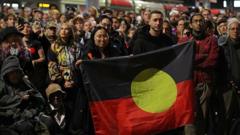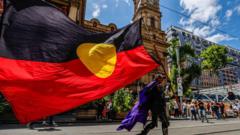A recent inquest into the 2019 police shooting of Aboriginal teenager Kumanjayi Walker concluded that racial bias contributed to his death, calling attention to the culture of racism within the Northern Territory Police Department.
Institutional Racism Identified in Fatal Police Shooting of Aboriginal Teen

Institutional Racism Identified in Fatal Police Shooting of Aboriginal Teen
A coroner's inquiry into the death of Kumanjayi Walker reveals systemic racism within the police force responsible for his shooting death in Australia.
Kumanjayi Walker, a 19-year-old Aboriginal man, was shot by Constable Zachary Rolfe during an arrest attempt in Yuendumu in 2019. A recent public inquiry has deemed that the officer held "normalized" racist views prevalent within the police department he served. The findings highlighted a concerning aspect of Australian law enforcement culture, suggesting that Mr. Rolfe's actions were part of a broader issue of institutional racism.
The coroner, Elisabeth Armitage, presented her conclusions in the community near the site of Walker’s death. The inquest revealed a troubling pattern of oversight, where multiple complaints about Rolfe’s prior conduct towards Aboriginal individuals had been disregarded. This context deepens the controversy surrounding the case, providing insight into the systemic issues faced by Indigenous Australians within law enforcement.
Rolfe, who was charged with murder—a rare occurrence for officers acting in their official capacities—claimed to have acted in self-defense after being stabbed. His acquittal followed a jury trial in 2022, sparking protests and discussions about police practices and their impact on Indigenous communities in Australia.
In her report, Armitage stated, “I am satisfied that Mr. Rolfe was racist and that he worked in and was the beneficiary of an organization with hallmarks of institutional racism,” directly attributing cultural bias as a factor in the tragedy that unfolded. The inquiry has reignited calls for reform and deeper examination of police protocols in the Northern Territory, pushing for urgent change in the treatment of Indigenous peoples within the Australian legal system.
The coroner, Elisabeth Armitage, presented her conclusions in the community near the site of Walker’s death. The inquest revealed a troubling pattern of oversight, where multiple complaints about Rolfe’s prior conduct towards Aboriginal individuals had been disregarded. This context deepens the controversy surrounding the case, providing insight into the systemic issues faced by Indigenous Australians within law enforcement.
Rolfe, who was charged with murder—a rare occurrence for officers acting in their official capacities—claimed to have acted in self-defense after being stabbed. His acquittal followed a jury trial in 2022, sparking protests and discussions about police practices and their impact on Indigenous communities in Australia.
In her report, Armitage stated, “I am satisfied that Mr. Rolfe was racist and that he worked in and was the beneficiary of an organization with hallmarks of institutional racism,” directly attributing cultural bias as a factor in the tragedy that unfolded. The inquiry has reignited calls for reform and deeper examination of police protocols in the Northern Territory, pushing for urgent change in the treatment of Indigenous peoples within the Australian legal system.




















